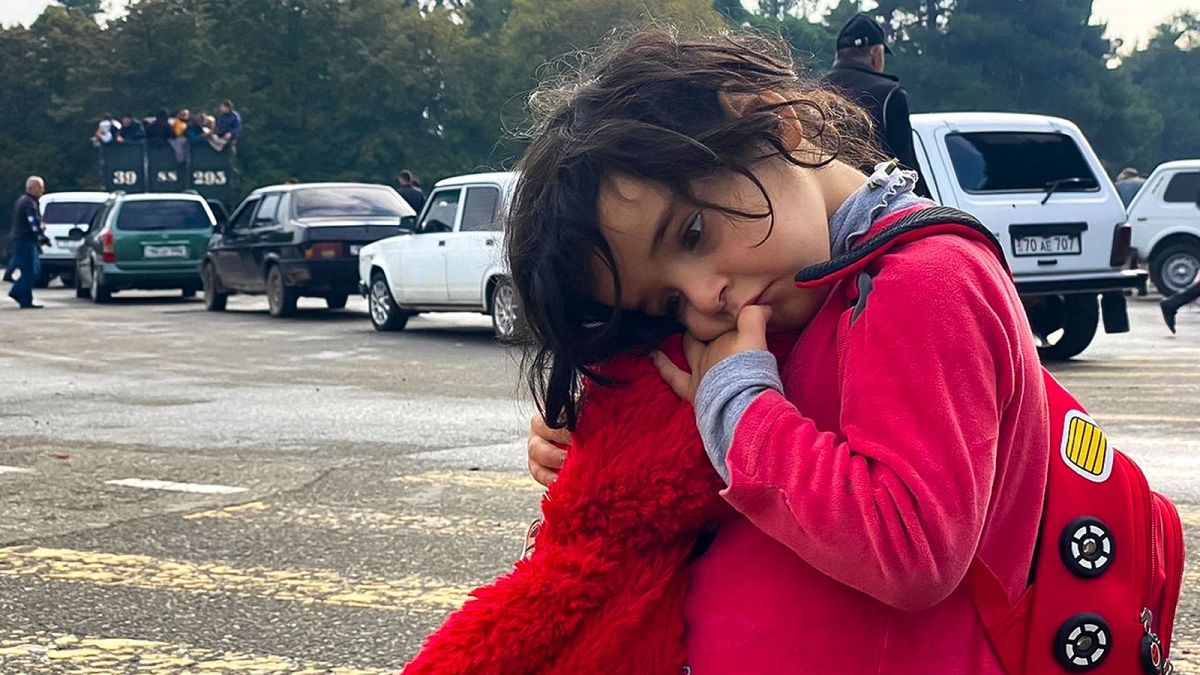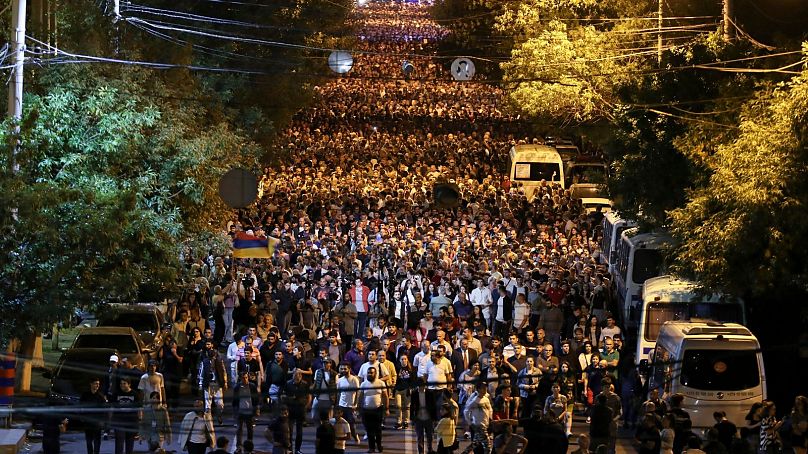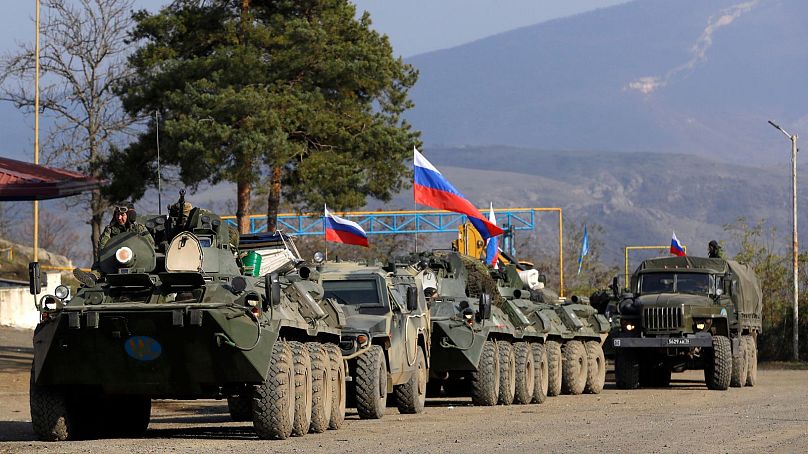Tens of thousands of homeless people travel to Armenia, where the leader faces daily protests amid a row with Russia.
Tens of thousands of now-homeless people have streamed into Armenia from the separatist region of Nagorno-Karabakh, controlled by its emboldened adversary, Azerbaijan.
Meanwhile, swarms of protesters are filling the streets of the Armenian capital of Yerevan, demanding the prime minister's ousting. And relations with Russia, an old ally and protector, have frayed amid mutual accusations.
Armenia now finds itself facing multiple challenges after being thrust into one of the worst political crises in its decades of independence following the 1991 collapse of the Soviet Union.
Developments unfolded with surprising speed after Azerbaijan waged a lightning military campaign in Nagorno-Karabakh, a majority ethnic Armenian region that has run its affairs for three decades without international recognition.
That triggered a massive exodus by the ethnic Armenians who feared living under Azerbaijani rule. More than 80% of the region’s 120,000 residents hastily packed their belongings and trudged in a gruelling and slow journey over the single mountain road into impoverished Armenia, which is struggling to accommodate them.
“There’s a tremendous amount of anger and frustration directed at Nikol Pashinyan,” said Laurence Broers, an expert on the region at Chatham House.
Pashinyan’s economically challenged government has to provide them quickly with housing, medical care and jobs. While the global Armenian diaspora has pledged to help, it poses major financial and logistical problems for the landlocked country.
Thomas de Waal, a senior fellow at the Carnegie Europe think tank, agrees with other observers that one factor in Pashinyan’s favour is that whatever simmering anger there is against him, there is just as much directed toward Russia, Armenia’s main ally.
After a six-week war in 2020 that saw Azerbaijan reclaim part of Nagorno-Karabakh and surrounding territories, Russia sent about 2,000 peacekeeping troops to the region under a Kremlin-brokered truce.
Pashinyan has accused the peacekeepers of failing to prevent the recent hostilities by Azerbaijan.
Russia has been distracted by its war in Ukraine, which has eroded its influence in the region and made the Kremlin reluctant to defy Azerbaijan and its main ally Turkey, a key economic partner for Moscow amid Western sanctions.
“Clearly, this Azerbaijani military operation would not have been possible if the Russian peacekeepers had tried to keep the peace, but they just basically stood down,” de Waal said.
The Kremlin, in turn, has sought to shift the blame to Pashinyan, accusing him of precipitating the fall of Nagorno-Karabakh by acknowledging Azerbaijan's sovereignty over the region and damaging Armenia's ties with Russia by embracing the West.
Russian President Vladimir Putin has long been suspicious of Pashinyan, a former journalist who came to power in 2018 after leading protests that ousted the previous government.
Even before Azerbaijan’s operation to reclaim control of Nagorno-Karabakh, Russia had vented anger at Armenia for hosting US troops for joint military drills and moving to recognise the jurisdiction of the International Criminal Court after it had indicted Putin for war crimes connected to the deportation of children from Ukraine.
The bad feelings escalated after the fall of Nagorno-Karabakh, with Moscow assailing Pashinyan in harsh language that hadn't been heard before.
The Russian Foreign Ministry blasted “the inconsistent stance of the Armenian leadership, which flip-flopped on policy and sought Western support over working closely with Russia and Azerbaijan.”
It remains unclear whether Pashinyan might take Armenia out of the Moscow-dominated Collective Security Treaty Organization, a group of several former Soviet nations, and other Russia-led alliances. Armenia also hosts a Russian military base and Russian border guards help patrol Armenia’s frontier with Turkey.
Despite the worsening rift, Pashinyan has refrained from threats to rupture links with Moscow, but he emphasised the need to bolster security and other ties with the West.
Even though the Russian peacekeepers didn’t try to prevent Azerbaijan from reclaiming Nagorno-Karabakh, the troops' presence in Armenia helps counter potential moves by Azerbaijan and Turkey to pressure Yerevan on some contested issues.
Baku has long demanded that Armenia offer a corridor to Azerbaijan's exclave of Nakhchivan, which is separated from the rest of the country by a 40-kilometre (25-mile) swathe of Armenian territory.
The deal that ended the 2020 war envisaged reopening rail and road links to Nakhchivan that have been cut since the start of the Nagorno-Karabakh conflict, but their restoration has stalled amid continuing tensions between Armenia and Azerbaijan.
Azerbaijan has warned it could use force to secure the corridor if Armenia keeps stonewalling the issue, and there have been fears in Armenia that the corridor could infringe on its sovereignty.
“I think there is extreme concern about this in Armenia, given the very dramatic military asymmetry between Armenia and Azerbaijan today and given the fact that Russia has ostensibly abdicated its role as a security guarantor for Armenia,” Broers said.
Despite Western calls for Azerbaijan to respect Armenia’s sovereignty as well as strong signals from Iran, which also has warned Azerbaijan not to use force against Armenia, tensions remain high, he noted.
“The issue is to what extent Azerbaijan and Turkey, backed maybe quietly by Russia, push this issue," de Waal said. "Do they just sort of try and force Armenia at the negotiating table or do they actually start to use force to try and get what they want? This is the scenario everyone fears.”


